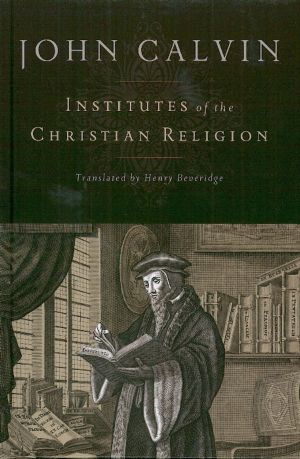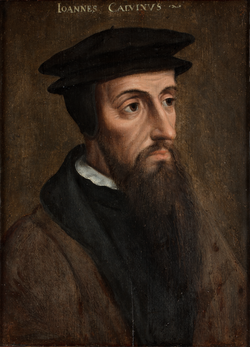I did it partly for a strange kind of flex. Being able to say “I read Calvin’s Institutes from cover to cover” has to be the reading equivalent of saying “I ran a marathon.”
Full disclosure, I did it as part of a group.
When the Dordt theology department offered the chance for the rest of the faculty to read Institutes of the Christian Religion alongside them during the 24-25 academic year, a shocking number of us took them up on it, me included. It would have been impossible otherwise. Reading alongside a theologian, in my case Dr. Kyle Dieleman, made all the difference.
Fuller disclosure, I primarily listened to it, which may seem like cheating. In my defense, it was still more than 67 hours of content, and it was the Henry Beveridge translation, which is pretty dense.

Still, the question remains, why did I really do it? How often does one use “I read Calvin’s Institutes” as a flex?
Fullest disclosure, I wanted to do it for a specific kind of flex on a group I’ll call “originalists.” By originalists here I mean those who insist church authority comes from original Reformation texts, from “the old writers.” For Calvinists, there’s nothing more original than Calvin.
And yes, I’ve actually had this move used on me when others said certain practices of our church go back to JC himself and therefore are right. I doubted the claim. Here was a chance to find out.
I also simply wanted to find the real ideas, and maybe the real man, behind the churches I’ve worshiped in my whole life—to say nothing of garnering insights on contemporary Calvinism in modern life. Severance, Kier be praised, is all kinds of Calvinist.
And so last August, we began wading through the Institutes with its apparently famous opening, “Our wisdom…consists almost entirely of two parts: knowledge of God and of ourselves” (1:1:1).
To be honest, I didn’t know that opening was famous. I’m not a theologian and I didn’t attempt to read the Institutes like one. So while I cannot begin to summarize the Institutes, here are a few of my non-expert takeaways in a time when people like to make vague gestures in his direction.
(Nobody: Me: “So, Calvin’s Institutes….”)
1) Calvin was a smarty pants. And maybe OCD.
As we read, we encountered “obloquys” and “cavils”—oh, so many cavils—“calumnies” and “adventitious farragoes.” (Calvin + Beveridge adds up to the highest of highbrow insult voices I’ve ever read).
Oh, and “pravity,” apparently that’s a word. Here it is in context: “We again regard it as sin whenever man is influenced in any degree by any desire contrary to the law of God; no, we maintain that the very pravity which beget in us such desires is sin” (3:3:10).
As “overwhelmed” is to “whelmed” (which already means “engulfed” or “submerged”) so “depravity” is to “pravity,” which means “moral degeneracy, perversion.” I LOL-ed at the word and cued John Mayer in my head: “Prav-ity…is working a-gainst me. Prav-ity…wants to bring me down.”
Calvin actually doesn’t use TULIP’s famous T, “total depravity,” in the Institutes, though he uses “depravity” plenty. Still “depravity” is one of the areas I came out thinking about differently. Prior to reading the Institutes, I had always thought of “total depravity” in a self-flagellating, self-pitying sort of way: “I’m totally depraved, and sure, so are we all, but it’s really all my fault individually for sucking so bad at life.”
Calvin is certainly heavy on the inability of the human to do any good thing apart from God, to the point where you wonder deeply about human agency, but I came away thinking of depravity—and of course pravity—as more akin to the conditions of reality. Like being underwater and not realizing it. Everything is not what it’s supposed to be, but we can’t ever really recognize that because we’ve never had air to compare it to. Granted, I think Calvin wants us to take depravity personally, too, but after reading, I take it more as a condition of human existence.

As to being OCD, it’s just such a monumental work; it would necessarily take a certain kind of brain to do it. Of course, at this point I hear fanboys or maybe originalists saying, “But it’s the Lord’s work that we should be obsessed about! What else is there?” Yes, of course. Maybe Calvin lived an imbalanced life so we didn’t have to.
Reading the Institutes as a teacher of literature, I kept thinking about comparative texts. Since I’ve never read another systematic theology, the thing I kept coming back to was J.R.R. Tolkien’s legendarium: a huge layout of history and mythology and etymology that was the necessary foundation for the superstructure that was The Lord of the Rings. Maybe that’s a stretch. However, Dr. Dieleman kept reminding us that Calvin saw the Institutes as pastoral in nature. Calvin was writing to pastors with the goal of making clear a framework for understanding the Bible to in turn improve the weekly preaching to the people. Just as Tolkien’s legendarium was the foundation for the clear story of The Lord of the Rings, so I think of the Institutes as the systematic theology that made the superstructure of day-to-day preaching circa 1560 more possible.
(Also in the Tolkien theme, if I were to go back and reread any section of the Institutes, I might pick the section on angels, which I found very biblically imaginative.)
2) In many ways Calvin’s Institutes is exactly what you think it is. He’s eloquent to the point of poetic on the trinity, especially the Holy Spirit, “diffused over all space, sustaining, invigorating, and quickening all things, both in heaven and on earth…transfusing vigor into all things, breathing into them being, life and motion” (1:13:14). That could be Gerard Manley Hopkins.
He’s insistent to the point of exhaustive on the providence of God: “…[W]e are his sons, whom he has undertaken to nourish and bring up in allegiance to him, that we may expect the substance of all good from him alone, and have full hope that he will never suffer us to be in want of things necessary to salvation, so as to leave us dependent on some other source” (1:14:22).
He’s magnificent on the mediation and love of Christ:
“If we seek salvation, we are taught by the very name of Jesus that he possesses it; if we seek any other gifts of the spirit, we shall find…strength in his government; purity in his conception; indulgence in his nativity, in which he was made like us in all respects; in order that he might learn to sympathize with us; if we seek redemption, we shall find it in his passion; acquittal in his condemnation; remission of the curse in his cross; satisfaction in his sacrifice;…newness of life in his resurrection; immortality also in his resurrection; the inheritance of a celestial kingdom in his entrance into heaven;…secure anticipation of judgment in the power of judging committed to him.” (2:16:19)
He’s a hard…liner on predestination: “Those, therefore, whom he has created for dishonor during life and destruction at death, that they may be vessels of wrath and example of severity, in bringing to their doom, he at one time deprives of the means of hearing his words, at another by the preaching of it blinds and stupefies them more” (3:24:12)—much harder than even the Canons of Dort, which says that in “reprobation” some people “have been passed by” (Article 15).
I never got comfortable with a few things in the Institutes, the foremost being that term “reprobate.” I just don’t find it very helpful in thinking about myself or my neighbor. But Calvin uses it to draw thick, clear lines around the church. Perhaps this is partly why originalists like him so much. In the Institutes, Calvin seems to be after certainty, another word that’s spawned recent spats in the Christian Reformed Church. He wants to establish clear boundaries between those who are in and those who are out and to establish ways for people to know which they are and yet to hold onto church authority in setting those boundaries.
It’s maybe at this point that I should acknowledge how hard it was for some people in our group to read Calvin. To be fair, our numbers were split almost evenly between fans and critics. There were readers for whom Calvin was a hero and a new-to-Calvin reader excited about his intellectual depths.
But there were also the harmed. At least two people in my group dropped out because they’d felt the heavy hand of theology in various ways in their lives already and didn’t want to repeat the experience. One person recalled the near inability of his parents to compliment their children at all because of Calvin’s emphasis on, well, pravity. Another was like, “Yeah, I’ve lived with this all my life—why do I need more of it?” A third was haunted by practices of her church that especially tended to marginalize women. My own earliest memories of church are the hurt caused by our church’s handling of my sister’s teen pregnancy.
Since Calvin—heck, since the 1980s—we’ve rethought a few things, both church order that harms people and words like “reprobate,” a word that has had real destructive power, especially combined with the machine of empire. (“Reprobate” makes me think of Kipling’s “White Man’s Burden,” a poem that doesn’t use the word “reprobate” but is arguably a secularized version of the elect and the damned. Closer to home, there’s the CRC’s use of a synonym for reprobate, “heathen,” as in “The Heathen Mission Board.” )
I think one of my underlying fears in the originalist impulse rallying to Calvin is that people want to go back there.
That’s a time travel mistake, and it’s a mistake that theologians like Dr. Dieleman don’t make. Reading Calvin, in light of people hurt by Calvinist practices, in light of transcendent passages on the trinity and Christ’s love, in light of the dark passages on double predestination, in light of hope beyond the grave, there’s just no way not to read it—like any text—as historically situated. Reading Calvin, we can revisit what spurs us on, but we also turn from what misshapes, from weaponized Calvin, so to speak.
This is where Calvin’s ideas about church practices are perhaps the most interesting thing. In what I’d heard from originalists, we want to go back to Calvin because he had the boundaries on worship and other things right.
Oh really?
3) Despite his verbosity, Calvin seems to have the common people in mind, especially when it comes to day-to-day church practices.
In the Institutes, the Sabbath is certainly made for the human. “I do not cling so to the number seven as to bring the church under bondage to it,” he writes, “nor do I condemn churches for holding their meetings on other solemn days.” He likewise firmly and in no uncertain terms denounces “sabbatism” (2:8:34). Surprising for a tradition known for leaning Sabbatarian.

Then there’s the Lord’s Supper, which is best celebrated as often as you can: “the sacrament might be celebrated in the most becoming manner, if it were dispensed to the church very frequently, at least once a week” (4:17:43).
He’s also a big fan of infant baptism, largely for the comfort that it gives. “For how sweet is it to pious minds,” he reflects, “to be assured not only by word, but even by ocular demonstration, that they are so much in favor with their heavenly Father… Here we may see how he acts toward us as a most provident parent, not ceasing to care for us even after our death, but consulting and providing for our children” (4:16:32).
As I read about these practices, I realized I had a specific audience in mind: the poor. All of these practices seem generally helpful and inviting to the beleaguered masses. Maybe because of Dr. Dieleman’s description of Calvin’s own life—a son dying in infancy, the prevalence of plague, his own sickliness—I began to picture Calvin’s world in Hobbesian terms (Calvin and Hobbes!) as “nasty, short, brutish.” In a world of plague, of short life expectancies, of infant mortality, the church practices Calvin advocates for are pretty inviting, rather hospitable, maybe even liberal.
4) Because of people’s Hobbesian lives, Calvin is after comfort and surety for people’s souls.
This one only came home to me only because of my own context. As we were reading, I wasn’t really so sure about the pastoral claims that Dr. Dieleman made about the Institutes, that Calvin actually sees this work as pastoral as opposed to just hard-edged doctrine.
And then, out of nowhere, my sister couldn’t remember where the bathroom was. In her own house. Tests showed a brain tumor. On Thursday, June 5, right before she submitted to surgery, the surgeon told us it was a “hyper-aggressive” tumor, growing and dying so fast that it was hard to name just what kind of tumor it was. Only after surgery could they name it for certain, a Glioblastoma.
I have a name for it, too. Evil.
While my sister underwent what would be a six-hour surgery—surgery in which she would be awake and talking to a speech therapist to make sure the surgeon didn’t hit the arcuate fasciculus, the word center of her brain—my thoughts came back to Calvin and his passionate assurances to parents, the implied deaths of children, and simply lurking death.

My sister is one of the strongest Christians I know. She and her husband ran a church camp for years. She always had the name of Jesus on her lips. Her husband was taken suddenly from this life by a pulmonary embolism in 2019. Now this. Lightning striking twice, I told her adult children in the waiting room. How does one make sense of it?
One doesn’t.
Calvin tried.
Another thing that Dr. Dieleman talked about as we read was “the problem of grace.” If the problem of evil asks “Why do bad things happen?” the problem of grace asks “Why do good things happen?”
Calvin probably wouldn’t agree with my assessment of the evil tumor. For Calvin, the providence of God both sent the tumor and provided the surgeon, so I can be assured both her life and her death and everything in between are in the hands of God. I do not quite agree with this still, but I get it now. There is no place—even a tumor growing so fast it’s killing itself and my sister—that God has not been well before we get there.
I’m also convinced now what Calvin’s focus would have been if he were with us in that waiting room: God with her, God with us.
What’s the point of reading Calvin?
For me, it’s not to go back. That never makes sense.
Nor is it to have once-and-for-all answers. In a waiting room during brain surgery, no answers are 100% true.
Nor is it any longer to have a flex on originalists.
It’s to think my way into why a tumor ravages my sister’s brain.
It’s to be reminded of the problem of grace in the midst of the problem of evil. Of the witness to the gospel that my sister has been. Of the wonder and terror of brain surgery while you’re awake. Of the divine love story of a seemingly fragmented group of scriptures.
It’s to assure my faith and hers, the faith of all believers, in the face of death.


11 Responses
Thanks for this report. Delightful and affecting. Warms my heart that Tolkien should help us understand Calvin! As to your marvelous comment about Calvin and the poor, and then point 4, there is a recent move in Calvin scholarship to bring out the importance of his being an exile, a refugee, writing for other exiles and refugees, for whom the cost of their discipleship meant all kinds of loss and hatred and suffering and hardship.
On another point, I’m curious why your group didn’t use Battles, although I know it’s often contended that Beveridge is more accurate.
Because mine’s not done yet 😉
Touché
Yes … the depth of Calvin is pastoral.
Howard, Thanks for this. I’ve read it three times—it’s so rich and readable.
Nicely done, this, and it gets better with each new paragraph! I think Calvin–if he did not wholly agree with your take on your sister and her tumor (I’m not sure)–would certainly understand it, and approve of where you went with it.
A quibble, however: Calvin’s doctrine of election is shrouded in mystery as far as its application to specific individuals is concerned. The Christian is to trust his or her faith is grounded in God and not themselves, and that is intended as a comfort.
In the same way, it is never legitimate–indeed, it is a kind of blasphemy, an intrusion into the things of God where we are not invited–to conclude that we or anyone else is “reprobate.” We are always to hope for every living being we encounter, despite appearances (at times). In the same way Calvin says we should assume that the confession of faith and the profession of faith are grounded in God’s grace, but as for ourselves, it should never make us so certain we take it for granted.
There is certainly no warrant for mapping that theological construct–especially one that Calvin insists involves God’s unique prerogatives, both in their manner and in the ultimate knowing of them–onto our all-too-human divisions of the human race into tribes and nations and such. Calvin had an almost hyper-sensitivity to the “inscrutability” of so many things about God, and constantly warned against attempting to pry into the workings of God’s mind–as if we could discover the reasons for God making the choices he has. The hiddenness and mystery that cloaks God’s work of grace should make us exceedingly humble about coming to conclusions regarding any one in this matter–and certainly never any group!
(Calvinists have throughout history often been exceedingly poor about appreciating just how central this mystery and uncertainty is, in fact, to Calvin’s understanding, but that’s true of every theological current. Even theological systematizers can be inconsistent when they’ve become caught up in the power struggles of the world. Even more, the harder, less flattering, aspects–along with much of the nuance and qualification–get left behind at street-level.)
Howard, thanks for taking the time to write your reflections on Calvin and your sister’s glioblastoma. I’m so sorry with you, her, and your whole family that you all have to deal with terrible, frightening illness. But OCD is a terrible illness too. I have a friend who has days, and sometimes weeks, enduring the grip of this terrible illness, and other times when it subsides some. It’s focus and dedication that brings about a work like the Institutes, or Barth’s Great White Whale for that matter, but not OCD. Please, OCD is an illness, not a punchline.
Thank you, for reading the Institutes of Calvin and for sharing with us this warm, caring reflection on the experience. I was blessed this morning in reading your well-written, very personal reflections. Ii has led me to commit to re-reading the Institutes too.
I lost Colleen, 13 years ago. Diagnosed on August 22, brain cancer, our 44th wedding anniversary. Then that dirty, nasty, evil word–Glioblastoma. Yes, and my kids lost their Mom, my grandkids lost their Nana, and so many lost a friend.
God is God–is the best I can do. Though a friend introduced: “God is God; we are wee.” Thanks for exposing more of Calvin, it helps.
A lasting memory; our church, Lynden love, and far beyond, addressing our grief. And a second memorial service in New Mexico, where we lived for 23 years, cross-cultural, singing in Navajo “Where could we go but to the Lord,” All that love, an enormous gift from God, as I’m sure author Schaap experienced. But how about those who die alone?
Its all still mysterious, this life, and death.
Thank you for this. I just finished a memoir by Cait West, Rift, about her experience in Christian patriarchy of the Reformed variety. Lots of spiritual abuse, domineering daddy, shaming of women and their bodies. And only minimal education for girls who can only be wives and mothers. And I wonder what the lines are from Calvin to that. A few are obvious I realize. And I know I read Calvin differently, but I still wonder how these patriarchal fellows have come to use Calvin as they do. For as arrogant as Calvin and followers could sometimes appear there was still a kind of humility there which seems lost in the ways some of these groups treat women.
Are we all just reading into Calvin what we want to find???
Thanks for this,Howard! I’ve plowed my way completely through the Institutes twice, once as an undergraduate in a semester course for which it was the ONLY text (Beveridge), and once on my own (Battles). I’ve come back to the last chapter (civil government) a number of times in helping understand the origins of the Puritan colonies in New England.
Finally–my best regards to your dear sister. She was one of the most memorable students I ever encountered.
bob